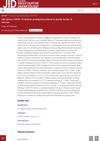1 citations,
October 2021 in “Indian Journal of Plastic Surgery” The paper offers a clear guide for diagnosing and treating hair loss, helping surgeons decide on hair transplant timing and extent.
Hair can naturally regain color after greying, and this change may be linked to stress levels.
1 citations,
January 2021 in “Clinical dermatology review” Severe hair loss significantly worsens quality of life.
 1 citations,
September 2017 in “Textual Practice”
1 citations,
September 2017 in “Textual Practice” The document concludes that Hilary Mantel's memoir shows how childhood experiences affect adult health, criticizing modern medicine for ignoring the mental aspects of physical illness.
 1 citations,
October 2011 in “PubMed”
1 citations,
October 2011 in “PubMed” Teen hair loss is common, can be caused by genetics or health issues, and can be diagnosed and treated.
 July 2024 in “Dermatology Practical & Conceptual”
July 2024 in “Dermatology Practical & Conceptual” COVID-19-related hair loss may have unique features compared to hair loss from other causes.
 June 2024 in “British Journal of Dermatology”
June 2024 in “British Journal of Dermatology” Permanent hair loss from chemotherapy significantly impacts patients' mental health and social life, highlighting the need for better patient education and support.
 June 2024 in “Trends in Urology & Men s Health”
June 2024 in “Trends in Urology & Men s Health” Post-finasteride syndrome is rare but serious and should be taken seriously.
 June 2024 in “IP Indian journal of clinical and experimental dermatology”
June 2024 in “IP Indian journal of clinical and experimental dermatology” Hair loss has many causes and treatments, but future research aims for better solutions.

Men with hair loss are seen as less attractive and shorter, and height is a key factor in attractiveness ratings.
 March 2024 in “CRC Press eBooks”
March 2024 in “CRC Press eBooks” Telogen effluvium is a type of hair loss where more hair than normal falls out after stress or illness.

Early-onset baldness is linked to genetics, lifestyle, and can indicate higher risk for heart and metabolic diseases, and affects mental health.
 January 2024 in “Annals of Dermatology”
January 2024 in “Annals of Dermatology” Female pattern hair loss greatly affects women's quality of life, causing mild depression and anxiety, and increases medical expenses.
 December 2023 in “Journal of family medicine and primary care”
December 2023 in “Journal of family medicine and primary care” Many people in Saudi Arabia experienced hair loss after COVID-19, especially women, those treated with antivirals, and those with a history of hair shedding.
 August 2023 in “International Ayurvedic medical journal”
August 2023 in “International Ayurvedic medical journal” Improper diet, lifestyle, and stress are major causes of hair fall.
 August 2023 in “Tzu Chi Medical Journal”
August 2023 in “Tzu Chi Medical Journal” Iron deficiency is the main cause of hair loss in women, and iron supplements started within 6 months can improve hair health.
 July 2023 in “Journal of Cosmetic Dermatology”
July 2023 in “Journal of Cosmetic Dermatology” Practitioners treating hair loss need better education and resources to overcome challenges like commercial bias and ethical dilemmas.

Alopecia patients in the UK want more empathy and better care from healthcare providers, including more GP training on alopecia and improved care pathways.
 June 2023 in “GALENICAL Jurnal Kedokteran dan Kesehatan Mahasiswa Malikussaleh”
June 2023 in “GALENICAL Jurnal Kedokteran dan Kesehatan Mahasiswa Malikussaleh” Telogen effluvium is a form of hair loss caused by various factors and requires identifying the cause for proper treatment.
June 2023 in “Australasian Journal of Dermatology” Australian dermatologists are updating their prescriptions for male pattern baldness.
 June 2023 in “Brazilian Journal of Health Review”
June 2023 in “Brazilian Journal of Health Review” Hair transplantation improves life quality and self-esteem in men with male pattern baldness.
 April 2023 in “Journal of Investigative Dermatology”
April 2023 in “Journal of Investigative Dermatology” People who had severe COVID-19 are more likely to experience hair loss.
 March 2023 in “Seminars in reproductive medicine”
March 2023 in “Seminars in reproductive medicine” PCOS often leads to sleep problems, especially obstructive sleep apnea, affecting overall health.
 January 2023 in “Archives of Disease in Childhood Education & Practice”
January 2023 in “Archives of Disease in Childhood Education & Practice” Hirsutism in teens is often due to polycystic ovarian syndrome and needs careful assessment and support.
 November 2022 in “Revista Hospital Clínico Universidad de Chile”
November 2022 in “Revista Hospital Clínico Universidad de Chile” COVID-19 may cause hair loss due to the virus's effects and stress from the pandemic.
 October 2022 in “Research, Society and Development”
October 2022 in “Research, Society and Development” Hair loss is a symptom of long COVID and can be treated with a protein-rich diet.

Isotretinoin may cause temporary, reversible facial hair growth in some women.
 June 2021 in “Health and Society”
June 2021 in “Health and Society” Healthy lifestyle changes, especially weight loss, can improve symptoms and overall health in people with Polycystic Ovary Syndrome, especially if they are overweight or obese.
Hair can naturally regain color, and stress might influence greying and its reversal.
August 2019 in “Journal of the American Academy of Dermatology” Depression and hair loss may influence each other.























